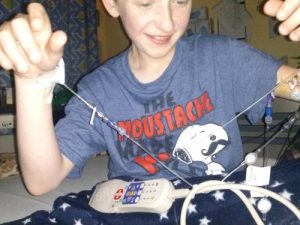Learning to Laugh at Embarrassing Medical Moments

Being human makes everyone susceptible to embarrassing moments. Some have learned to deal with them by laughing at themselves. Facepalm-worthy fumbles happen, even when dealing with something as serious as a rare disease. Medical faux pas might sound like no laughing matter, but in my experience, they can offer comic relief.
One hospital hiccup happened when my son Cullen was admitted for several weeks due to worsening pulmonary arterial hypertension and heart failure symptoms. Exhausted by lack of sleep and worry, I made a coffee run to the cafeteria. When I returned to Cullen’s room, I found him standing beside his bed, medical equipment unplugged and his mobile IV pole in hand. I gathered his central lines and led him to the bathroom. At the door we stood there staring at each other.
I asked him what he was doing, and he asked me the same. I told him I was helping him to the bathroom, to which he replied, “I was coming back from the bathroom and trying to get back in bed.” When I asked him why he let me walk him to the bathroom door, he replied, “Because I thought that was your way of straightening out the wires.”
We lost ourselves in laughter, which doubled when we discovered that a nurse had slipped in the room and witnessed the confusion. She quietly helped Cullen back into bed while I stood there feeling a bit embarrassed, but still amused, by our misunderstanding.
But there was another hospital predicament long before this one that had both my husband and me unexpectedly laughing. A right-heart catheterization diagnosed Cullen’s PH when he was 8. We were still in shock when time came for his next big procedure. A central line was placed to begin continuous intravenous Flolan (epoprostenol GM). Another heart catheter and pulmonary angiography tested Cullen’s condition and responsiveness to certain medications.
As new PH parents, we didn’t know what to expect during Cullen’s recovery. He was slow to wake, and very loopy when he did. I held his hand, and with tears in my eyes encouraged him to repeat what he was trying to tell us. I was hoping for, “I love you,” but instead, in slow motion Cullen said, “I-i-i-i / Ha-a-ave / To-o-o-o / Pe-e-e-e!”
It reminded me of the scene in “A Christmas Story” when Ralphie’s decoder message turns out to be a crummy commercial for Ovaltine. I’m sure Cullen’s nurse wasn’t expecting to find us sitting by our son’s hospital bed with tears from laughter running down our cheeks. But I think it was the medicine we needed at that moment.
I experienced many goofy PH moments with Cullen, but some doozies happened when he was 14 and recovering from his heart and double-lung transplant.
Not only did he have chronic pain in his chest from surgery, but an immunosuppressant caused a rare condition, posterior reversible encephalopathy syndrome (PRES), which gave him debilitating migraines. He felt so bad he often relied on a wheelchair during hospital appointments. But his transplant doctor was adamant that she wanted him out of it and up and walking. It was a lecture he repeatedly received.
We understood that exercise was important to his recovery, but sometimes I allowed him to give in to the chair. One day, he was sitting in one as we waited for the hospital valet to bring us our car, when I spotted his transplant doctor headed our way. Nervously, I started tilting the wheelchair forward and begging Cullen to get out of it. He asked loudly, “What’s wrong with you?” and immediately jumped up when I told him. Meanwhile, the valet and other families waiting at the entrance were looking at me with shocked expressions. I’m sure they couldn’t think of any good reason for me to dump my son out of a wheelchair. In my defense, when we told our PH-transplant friends what happened, they could relate and laughed along with us.
The PRES and chest pain sent Cullen to the emergency room on several occasions, but one stands out in my mind. Feeling very relaxed after receiving pain medication, Cullen slowly exited the ER. Standing between our car and a no smoking sign was a woman arguing with someone and smoking. Instead of minding his own business like he normally would, Cullen approached her, pointed to the sign, and asked her to read it. The stranger didn’t appreciate the message, and Cullen didn’t appreciate me wrestling him into the car. It wasn’t humorous at the time, but again, when we told our PHriends later, it was.
When faced with health challenges, uncomfortable medical moments are bound to happen. Use them as reminders that you are still human, and that laughter is the best medicine.
***
Note: Pulmonary Hypertension News is strictly a news and information website about the disease. It does not provide medical advice, diagnosis, or treatment. This content is not intended to be a substitute for professional medical advice, diagnosis, or treatment. Always seek the advice of your physician or other qualified health provider with any questions you may have regarding a medical condition. Never disregard professional medical advice or delay in seeking it because of something you have read on this website. The opinions expressed in this column are not those of Pulmonary Hypertension News or its parent company, Bionews, and are intended to spark discussion about issues pertaining to pulmonary hypertension.









Leave a comment
Fill in the required fields to post. Your email address will not be published.